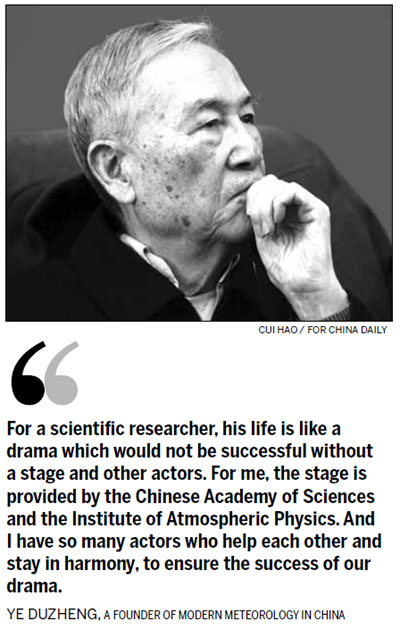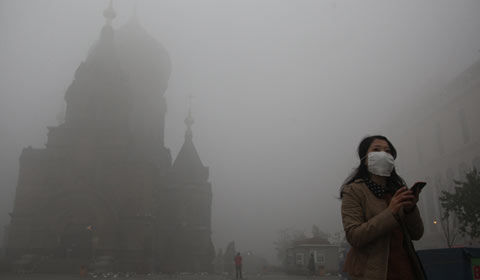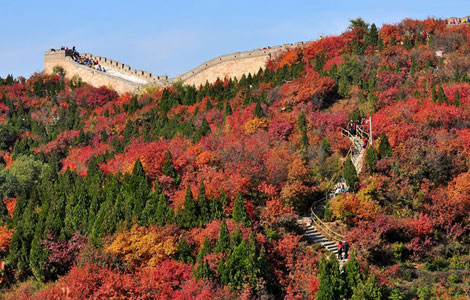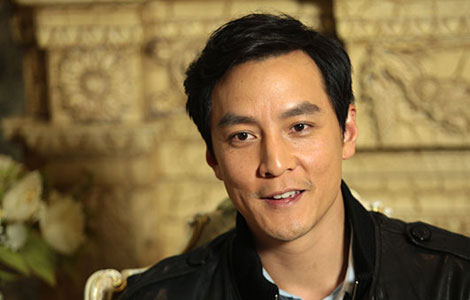Weatherman with vision dies, age 98
Updated: 2013-10-22 07:25
By Cheng Yingqi (China Daily USA)
|
||||||||
The weather forecast we check on a daily basis is accurate largely thanks to a man who contributed to the science of meteorology for more than 60 years - Ye Duzheng, one of the founders of modern meteorology in China.
Ye passed away in Beijing on Oct 16. He was 98.
Ye's funeral was held on Sunday at the Babaoshan Cemetery in Beijing and was attended by his colleagues, friends and students.
Ye was a senior academician at the Chinese Academy of Sciences, one of two prizewinners of the National Supreme Scientific and Technological Award in 2005, winner of three National Natural Sciences Award and a number of other Chinese awards. He received the highest award of the 2003 IMO Prize (International Meteorological Organization). He was the first Chinese scientist to receive this prize.
Ye's career in meteorology seemed written in the stars - the year of his birth, 1916, was when China began modern meteorological records.

But Ye spent his childhood just like any child in a government official's family in the Qing Dynasty (1644-1911). As the seventh child of 15, he learned Chinese classics at a traditional private school before going on to high school at the age of 14.
In 1935, Ye enrolled in Tsinghua University in Beijing, then named National Tsing Hua University. There Ye met Qian Sanqiang, who later became China's founding father of nuclear physics. Persuaded by Qian, Ye changed his major from physics to meteorology.
The person who influenced Ye most could be his doctoral supervisor Carl-Gustaf Rossby at the University of Chicago in the United States, according to Ye's students.
"Professor Ye took on Rossby's scholarship spirit. In a Chinese class, the teachers do most of the talking, while in a foreign class, the teachers are frequently questioned by the students. And just like Rossby, Professor Ye always starts with the facts. He is always forward-looking instead of getting bogged down in specific details," says Huang Gang, who finished postgraduate and doctoral study under Ye. Huang is a researcher at the Institute of Atmospheric Physics, Chinese Academy of Sciences.
When Ye returned to China in 1950, there were no weather maps in the country - the most basic tool for weather forecasting. The first thing Ye did was establish a team of 10 people to draw the country's first weather map.
Many of Ye's students still remember him pointing to a huge weather map hanging on the wall, saying that China's weather forecast should be based on physics and mathematics evidence. "The time that bad weather happens unpredictably should end in China," the students recalls Ye saying. "Ye came up with the idea of a weather forecast service system, the vision was prophetic," Huang says.
In the late 1980s when Ye was over 70 years old, he remained at the forefront of scientific research, and promoted the necessity of researching global climate change.
Ye's proposal received sharp opposition from other experts who thought global climate change would not impact China.
"Ye was the first scientist in China who raised the problem of climate change, though it was not his own profession," says Li Chongyin, a meteorologist and a senior academician of Chinese Academy of Sciences, also Ye's student.
Before Ye, China's climate research was basically to predict future climate on the basis of statistics, or to look for patterns of climate change. Ye was the first to think of climate change as a changing system including atmosphere, sea, ice and biology.
Under Ye's advice, the Chinese National Committee for World Climate Research Program was convened in 1985.
"Since then, China's climate change research has had a good start, and basically kept pace with international research," Li says.
The program, which works to develop scientific understandings needed to determine the influence of climate change, was established in 1984.
"Ye has a vision that is at least 20 years ahead," Huang Gang says.
chengyingqi@chinadaily.com.cn
(China Daily USA10/22/2013 page9)
 Teacher killed, two wounded in Nevada middle school shooting
Teacher killed, two wounded in Nevada middle school shooting
 Smog wraps northeast, schools forced to close
Smog wraps northeast, schools forced to close
 Architect looks to the big picture
Architect looks to the big picture
 Teachers, students divided over Gaokao reform plan
Teachers, students divided over Gaokao reform plan
 Dogfight looms over jets
Dogfight looms over jets
 Peak season for fall foliage in Beijing
Peak season for fall foliage in Beijing
 Train carrying carrying oil, gas derails in Canada
Train carrying carrying oil, gas derails in Canada
 30,000 turn out in Beijing Marathon
30,000 turn out in Beijing Marathon
Most Viewed
Editor's Picks

|

|

|

|

|

|
Today's Top News
Building a bridge of hearts in the heartland of the US
Li-Medvedev meeting to boost cooperation
China issues white paper on Tibet's development
Hollywood must think bigger about China
Nation witnesses launch of luxury rental businesses
Obama vows to get healthcare website fixed
US OKs Alibaba structure
Economy to see 'good ending' in Q4
US Weekly

|

|







